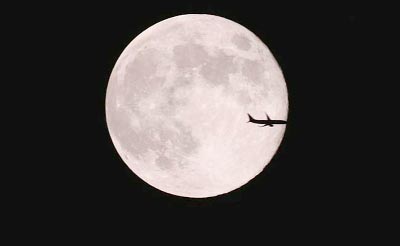
Reuters, Beijing :
China wants to put astronauts on the moon by 2036, a senior space official said, the latest goal in China’s ambitious lunar exploration programme.
China in 2003 became the third country to put a man in space with its own rocket after the former Soviet Union and the United States.
It has touted its plans for moon exploration and in late 2013 completed the first lunar “soft landing” since 1976 with the Chang’e-3 craft and its Jade Rabbit rover.
The country also plans to land the first probe ever on the dark side of the moon in 2018, another milestone.
China must “raise its abilities and use the next 15 to 20 years to realise manned lunar exploration goals, and take a firm step for the Chinese people in breaking ground in the utilization of space”, Lieutenant General Zhang Yulin, deputy commander of the China Manned Space Program, said.
Zhang made the comments in statement posted to the programme’s website on Thursday.
The official China Daily newspaper said the announcement marked “the country’s first confirmation of a manned lunar exploration programme”.
The paper cited experts saying China needed first to develop a powerful enough rocket to lift a payload of at least 100 metric tons into low Earth orbit. It also needs more advanced technology, including new space suits, for a lunar mission.
Advancing China’s space programme is a priority for Beijing, with President Xi Jinping calling for the country to establish itself as a space power.
China insists its programme is for peaceful purposes, but the US Defense Department has highlighted China’s increasing space capabilities, saying it is pursuing activities aimed to prevent adversaries from using space-based assets in a crisis.
Apart from its civilian ambitions, Beijing has tested anti-satellite missiles, and the US Congress has banned NASA from engaging in cooperation with its Chinese counterpart due to security concerns.
China’s space budget is still only about one-tenth of the United States’ outlays, officials have said. According to Chinese state media, China spends about $2 billion a year on its space programme, though details are vague.
China said this month that it would launch a “core module” for its first space station sometime around 2018, part of a plan to have a permanent manned space station in service around 2022.
China is also preparing to launch a Mars probe in 2020, which would reach the planet in 2021, the official Xinhua news agency has said.
China wants to put astronauts on the moon by 2036, a senior space official said, the latest goal in China’s ambitious lunar exploration programme.
China in 2003 became the third country to put a man in space with its own rocket after the former Soviet Union and the United States.
It has touted its plans for moon exploration and in late 2013 completed the first lunar “soft landing” since 1976 with the Chang’e-3 craft and its Jade Rabbit rover.
The country also plans to land the first probe ever on the dark side of the moon in 2018, another milestone.
China must “raise its abilities and use the next 15 to 20 years to realise manned lunar exploration goals, and take a firm step for the Chinese people in breaking ground in the utilization of space”, Lieutenant General Zhang Yulin, deputy commander of the China Manned Space Program, said.
Zhang made the comments in statement posted to the programme’s website on Thursday.
The official China Daily newspaper said the announcement marked “the country’s first confirmation of a manned lunar exploration programme”.
The paper cited experts saying China needed first to develop a powerful enough rocket to lift a payload of at least 100 metric tons into low Earth orbit. It also needs more advanced technology, including new space suits, for a lunar mission.
Advancing China’s space programme is a priority for Beijing, with President Xi Jinping calling for the country to establish itself as a space power.
China insists its programme is for peaceful purposes, but the US Defense Department has highlighted China’s increasing space capabilities, saying it is pursuing activities aimed to prevent adversaries from using space-based assets in a crisis.
Apart from its civilian ambitions, Beijing has tested anti-satellite missiles, and the US Congress has banned NASA from engaging in cooperation with its Chinese counterpart due to security concerns.
China’s space budget is still only about one-tenth of the United States’ outlays, officials have said. According to Chinese state media, China spends about $2 billion a year on its space programme, though details are vague.
China said this month that it would launch a “core module” for its first space station sometime around 2018, part of a plan to have a permanent manned space station in service around 2022.
China is also preparing to launch a Mars probe in 2020, which would reach the planet in 2021, the official Xinhua news agency has said.

